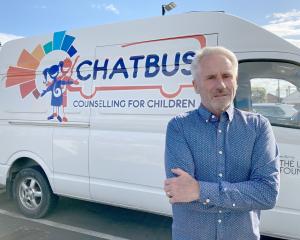Rufus May's recovery from delusions - that he was an apprentice spy for the British secret service with a device in his chest that was being used to control him - took time.
He was 18 when he was admitted to Hackney psychiatric hospital in London, diagnosed as schizophrenic and not allowed to leave.
Initially, he believed he was in a place for burnt-out spies.
"Eventually I thought people are being treated too badly for it to be a place for burnt-out spies."
Surely burnt-out spies wouldn't be humiliated, degraded and forcibly medicated - pinned to the floor while their trousers and underpants were pulled down to their ankles for an injection in the buttocks with mind-altering drugs?
In the frightening environment he now inhabited, May developed a scary, maniacal laugh to protect himself from his fellow inmates.
"I think I was half-expecting to be reunited with my girlfriend in a safe house because I thought she was a Russian spy."
May had been getting messages about his mission from the Bible and the radio. Between the age of 15 and 16 he was a heavy cannabis user, but he wasn't smoking at 18 when his troubles began - his first girlfriend left him after a nine-month relationship.
Instead of becoming depressed, May drifted into a dreamlike reality, where he was spied upon and felt he had special spiritual powers. In hospital he still thought he could communicate with his girlfriend via the Bible. When he stopped getting messages back, he cried. The dream was over.
"I realised that actually I wasn't that important and that I was in pyjamas in a psychiatric ward, dribbling. And then I started to think, 'Well, you're in the pit of society now - the only way is up'."
Coincidentally Yazz's 1988 pop hit The Only Way Is Up was playing on the radio.
Over 14 months May was admitted to hospital three times. His recovery began with going to church.
"I was religious with a capital R, then. I was trying to be a nicer person. I thought, 'I need to find a way to be of value to society so they don't lock me up again'."
When he was discharged, he was put on two-weekly injections for about six months, as an outpatient. He decided to become a clinical psychologist.
"I transformed, maybe not intentionally, but I found my mission - to try and change society's approach to mental health."
In a way he did become a spy.
"For a while I infiltrated mental health services."
It was cloak and dagger - when training in the East End, not far from where he had been sectioned, he was recognised on a couple of occasions by nurses. Fortunately they didn't blow the whistle.
He didn't tell his university about his illness until he was qualified.
"I separated from my delusions and they became metaphors that I could use symbolically."
May is in New Zealand doing some teaching with Hearing Voices Network Aotearoa NZ - a group dedicated to providing a better understanding of what it is like to hear voices and have visions and to reduce stigma attached to the experience.
Candid, considered, intense, May seems very much at home at the Earthsong community, where he and his wife and two sons are staying with friends.
"I'm quite interested in spiritual community - not in a kind of way where I postulate about spirits and God and things like that."
May says listening to others' voices means being a good role model and always being respectful.
"I do meditation in the morning. It helps me stay focused and centred and not get too cynical about the world."
During his mental illness, May didn't hear voices. He had delusions and unusual beliefs. But that didn't stop him being diagnosed with schizophrenia.
"I was given that label when I was 18 and I had a psychotic episode."
May argues the diagnosis of schizophrenia is a meaningless construct - a catch-all that does little more than label people with incurable hopelessness.
Is the label "psychotic episode" any better?
"A bit. I had a breakdown. I quite like the lay terms: 'I went crazy' or, 'I was mad' - I don't see them as any less scientific as saying 'psychotic episode'."
Though May can unpick the nonsense of psychiatric diagnoses, what's really radical about what he does is his therapy. He talks to the voices that schizophrenics hear.
The idea developed from the 1994 book Accepting Voices, by Marius Romme and Sandra Escher. It also builds on the work of people like Dirk Corstens, a psychiatrist and psychotherapist from the Netherlands, who runs voice-dialogue workshops.
May shook the psychiatry scene in April 2008 with his part in Leo Regan's documentary The Doctor Who Hears Voices, shown on Britain's Channel 4.
It's the story of "Ruth", a junior hospital doctor (played by an actor) who begins to hear a voice telling her to kill herself and others. May is her unorthodox therapist, who literally talks to her voice, to unpick its intentions and provide a path to recovery.
Some said May was "dangerous" and should be reported to the British Psychological Society. Others found the documentary confronting, raising serious implications for changing our approach to mental health.
"I believe people's voices are beings from their unconscious," says May.
"We all hear voices in our dreams. We all meet other people in our dreams - sometimes people we know, sometimes they're not known to us or they are other creatures."
He says people who hear voices are able to access their dream world when they're awake.
"They've got these characters talking to them."
He talks to the voices through a kind of role-play adapted from couples counselling techniques where different "parts" or personalities speak verbatim from a selected chair.
May says initially the voices often find him very threatening and do tell the person to hit him or worse. But so far, having spoken to hundreds of voices, it's never happened.
"I guess because I'm there to help the person and I'm being respectful. The first thing I teach people is that they don't have to do what the voice says."
The other thing May does is the opposite of what happens in exorcisms. He tells the voices he is not trying to get rid of them. When that message gets through he finds the voices often calm down.
Though the voices are like nightmare figures, mostly May finds they're trying to protect the person - albeit in a macabre way.
"So I don't see them as the enemy. I'm just saying we need to have peace talks with those experiences, not have a war trying to shut them down with medication."
May regards most mental health problems as some kind of post-traumatic reaction - be it the trauma of being alone, not having meaning in one's life, or having been abused. If voices are part of a person and the therapy is designed to get people to accept and understand their voices, how does May go about integrating an evil voice?
"It's a destructive voice. I would define evil as causing harm. A destructive energy is a very frightened energy coming from some place of fear. So I don't want to demonise it, I want to understand it."
He describes the case of a placating and gentle man who had an angry, commanding voice telling him to harm himself.
"I asked him to ask his voice why he wanted him to harm himself. The voice said, `To show people how powerful you are'."
The man then asked the voice whether, if he was powerful in other ways, he would still have to self-harm. Would the voice be happy if he was powerful in other ways?
"The voice said: 'That's what I've been trying to tell you for years'."
On the face of it, the voice was evil, but what it represented was the man needing to reclaim power in his life.
In another case, May spoke to a person's voice which was claiming to be a demon - an incubus. It said to him, "When you go home, take a long good look in the mirror". May was a little threatened, but a few weeks later the person had a memory of her adopted mother saying, "Look in the mirror, look at the evil in your eyes". Here the voice was an echo from the past of a time of oppression.
"I see them as messengers," says May. "They may appear as evil, but they're messengers about injustice. Evil is part of life. Destruction and violence are part of our lives and we need to understand it, not cast it out."
May believes people have different coping mechanisms for stress in their lives - "different ways of retreating from the world, or looking after ourselves that can sometimes turn into problems".
Problems we don't really understand and which we call schizophrenia or bipolar disorder or manic behaviour. It's a view that flies in the face of the "chemical imbalance" theory of mental illness that sees patients medicated to redress chemicals supposedly missing from their normal functioning.
May is not against the use of drugs in treating mental illness, but he does think they are used with too heavy a hand.
"We are over-convinced of their value."
He is a fan of combining body therapies - running, walking, swimming, tai chi, dance or boxing - with other treatments.
"A lot of psychiatric therapy is moving to the idea that we should work with the body as much as the mind - we've probably got to get out of our heads."
In in his own case, an obsessive preoccupation with his problems didn't help.
"The more one obsesses about something, the more real it can get."
Yes, he agrees providing scientific evidence for his approach is difficult.
"But we didn't need an evidence base to show that slavery was wrong. We know people's sadness or confusion is related to their lives. We also know that pills aren't the final answer."
What helped in his recovery was people accepting him and not giving up on him.
"I think we could have brilliant mental-health services, but still people would struggle because the community gives up on them and says, 'We can't help you, go to your doctor'."
May says his work is about building an emancipatory social movement that frees people to help each other more.
"I am idealistic," he says. "What I try to teach people with their voices is how [they can] appreciatively separate from these experiences and use them, but not be used by them ."
• Visit www.hearingvoices.org.nz for more information.



